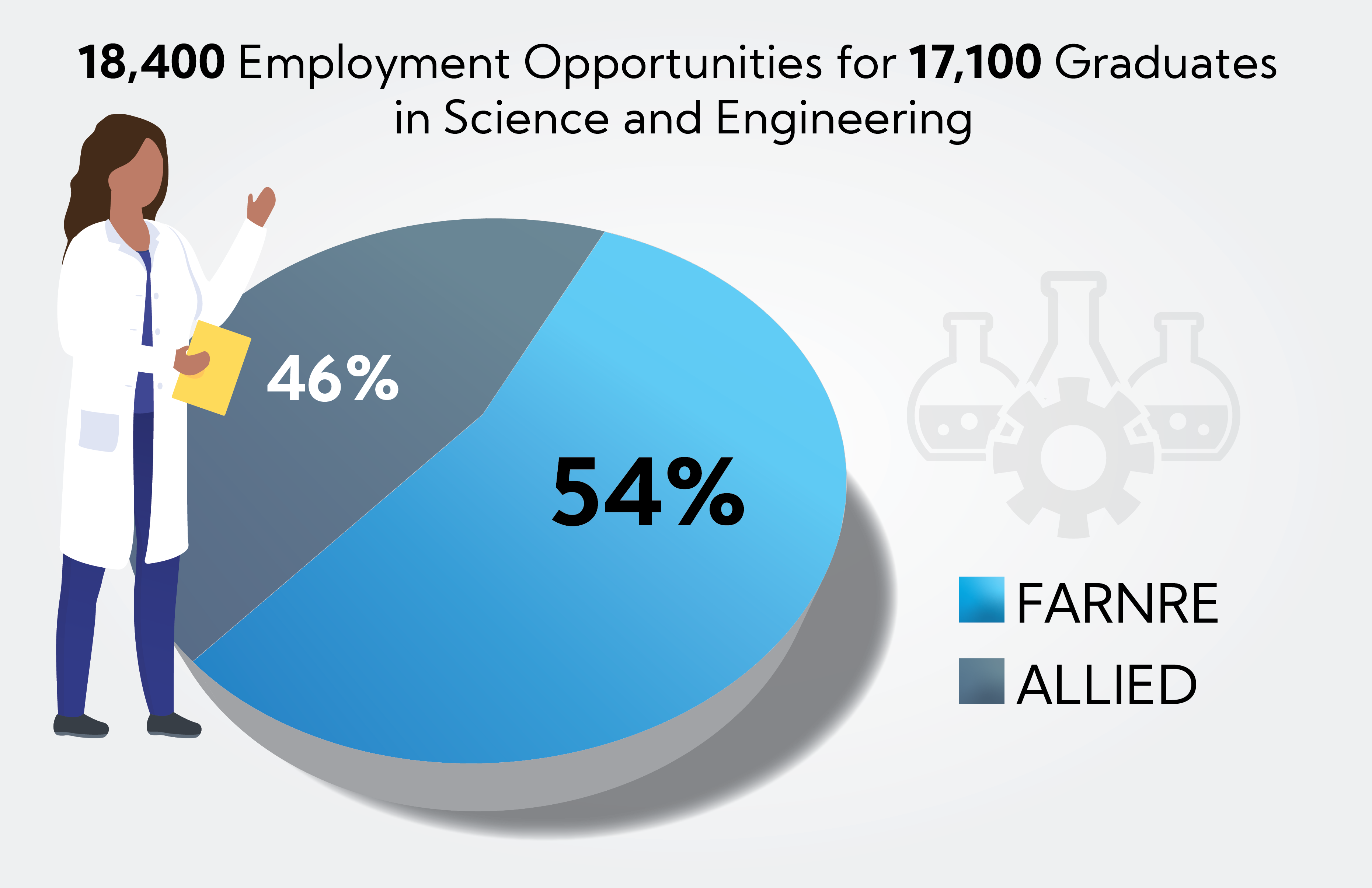Science and Engineering
The Science and Engineering cluster includes the life, physical, and social sciences and engineering occupations aligned with the production, transportation, processing, and distribution of food and fiber. Occupations focusing on the interface of food science, human nutrition and health are presented.
In the United States between 2020 and 2025, expect an average of 18,400 annual job openings with an emphasis on food, agriculture, renewable natural resources and the environment for new college graduates in Science and Engineering; and 17,100 graduates with degrees and expertise in science and engineering entering the food, agriculture, renewable natural resources and environment workforce. Approximately 31% of all available positions in food, agriculture, renewable natural resources and the environment are in Science and Engineering. Graduates with degrees from institutions offering academic majors and degrees in food, agriculture, renewable natural resources and the environment will fill approximately 54% (9,200) of the annual openings, with the other 46% (7,900) filled by graduates from allied fields of study.
[Figure 4. Approximately 18,400 Annual Employment Opportunities in Science and Engineering, and a Total of 17,100 Qualified Graduates Entering the Workforce]
Observations and Trends
Graduates with specialties in agronomy, plant science, plant breeding and genetics, forest science, and diagnostics and treatment of plant diseases should expect strong employment opportunities across all levels.
We predict continued strong placement of agricultural, biological and environmental engineers, as well as computer-based systems practitioners and analysts.
Scientists, technologists, process engineers, food and commodity packaging and biosafety, across food science and related disciplines should have robust employment opportunities. Food scientists, nutritionists and food processing engineers should continue to experience a strong employment market. Focal points will likely be the food and human health interface and use of dietary supplements.
Mitigation of climate change, as well as renewed efforts with recycling initiatives, will require an increasing number of scientists and technicians in agriculture and renewable natural resources. However, the number of college graduates in environmental management and environmental science is expected to significantly exceed available employment opportunities.
Increased emphasis on automation and robotics, precision management of agriculture and renewable natural resources, data science and analytics, artificial intelligence (AI), remote sensing and geographic information systems (GIS), and incorporation of statistical applications across all science, technology, engineering and math (STEM) disciplines sectors should bode well for graduate experts in these areas.
Expect large animal veterinarians and veterinary practitioners in rural areas to be in strong demand.
Environmental specialists who focus on water quality and management and on soil conservation and health, as well as environmental protection technicians should note good employment opportunities. Individuals with expertise in efficient management of water resources including hydrologists, irrigation specialists and water reclamation managers will continue to see strong employment opportunities.
Expanded opportunities are forecast for scientists, engineers and technicians focused on applying mega-data to advance efficiencies in agricultural production and natural resources management.
Expect favorable employment opportunities for biochemists, bioinformaticians, geneticists and research biologists, especially graduates with advanced degrees.
Expect an increase in biome scientists and microbiology related positions.
Graduates with advanced degrees and specialties in epidemiology, vector biology, virology, infectious diseases, pharmaceuticals, immunology and toxicology will continue to experience favorable employment opportunities.
One Health related career opportunities, medical specialists, nurses, dietitians and nutritionists should retain strong employment.
Anticipate lower opportunities in agricultural equipment design and production.
Opportunities for general, non-specialized animal scientists may not match the supply of graduates.
Zookeepers, wildlife and fisheries scientists and technicians, and fieldwork specialists may note lower employment opportunities available in the workplace.
